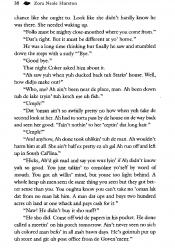Speech and Silence in Their Eyes Were Watching God
Throughout the novel, we consistently see Zora Neale Hurston use an unique style of language, specifically the rural Southern black dialect. Hurston depicts Janie’s life as a series of events which help her to acquire her own “voice,” which is the acknowledgment and expression of identity of the person she realizes herself to be. In the beginning of the novel, we learn about Janie as a very young, subservient, and most importantly a quiet girl. Throughout Janie's life and now in her marriage to Jody, she has served a subservient role: "No matter what Jody did, she said nothing" (76), and “she let it pass without talking” (78). Here Hurston is hinting at the fact that Janie's silence allows her husband to control her, restricting her from realizing her full potential. She states: “Maybe he ain’t nothing, but he is something in my mouth. He’s got tuh be else Ah ain’t got nothin’ to live for. Ah’ll lie an say he is. If Ah don’t, life won’t be nothin’ but uh store and uh house” (76). These thoughts represent the development of her identity as an individual, she is beginning to wonder who she is. By Janie stating that Jody is in her mouth she is suggesting that he is the one speaking, therefore he is her identity. It is this realization that allows Janie to begin examining her own identity and how she can express herself. Janie recognizes that she has to learn who she is and begin expressing that person until the end of her story.
A major aspect of Janie’s identity is the journey she went through to find herself. This aspect of discovering oneself is often how we leave our “mark” on the world. By passing down stories of struggle and success, following generations are able to see the process of establishing one’s identity and the process one takes to get there. In Alice Walker’s essay, “In Search of Our Mothers’ Gardens,” she mentions how black women have consistently been silenced when trying to tell their own, individual stories. We have minimal literature and novels from the early 1900s that are taught and discussed that depict the struggles of black women. For this reason, it is incredibly important that Janie, and Hurston, were able to tell her story within Their Eyes Were Watching God. Walker states, “But this is not the end of the story, for all the young women - our mothers and grandmothers, ourselves - have not perished in the wilderness. And if we ask ourselves why, and search for and find the answer, we will know beyond all efforts to erase it from our minds, just exactly who, and of what, we black American women are” (Walker 235). Through generational storytelling, individuals, specifically women, are able to ensure that their stories are heard and continued, even after they have established themselves and passed on. The language and dialect present within the novel demonstrates the importance of passing stories down through generations to ensure their longevity and provide guidance for those who come after.

